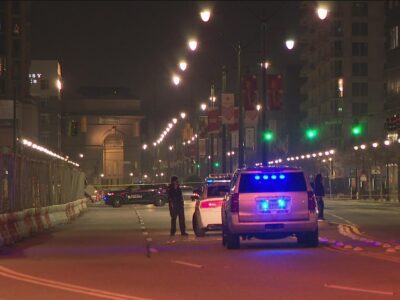Federal prosecutors have reached plea agreements with Travis McMichael and his father, Gregory McMichael, on hate crime charges they faced in the murder of Ahmaud Arbery, court documents show.
The plea deals, which come after the McMichaels were sentenced to life without the possibility of parole, allow them to serve their sentences in federal prison instead of a Georgia state prison. An attorney for Arbery’s mother said the family “is devastated” by the deal and vows to oppose it.
“A copy of the plea agreement has been provided to the Court for its consideration,” said the notices of plea agreements filed Sunday in US District Court, Southern District of Georgia.
A third man convicted of killing Arbery and also charged in the federal hate crimes case, William “Roddie” Bryan, was not mentioned in Sunday’s court filings. Bryan, who shot video of Arbery’s killing, was sentenced to life with the possibility of parole.
Federal prosecutors asked Ahmaud Arbery’s mother, Wanda Cooper-Jones, earlier this month if she would consider a plea deal for her son’s killers before the men were sentenced in Georgia, and she declined, CNN has reported.
In an Instagram post, Cooper-Jones’s attorney, S. Lee Merritt said he “will oppose this deal before the Court” Monday. He added, “This back room deal represents a betrayal to the Arbery family who is devastated.”
Trial drew national attention
The three defendants were convicted for their roles in Arbery’s murder, which occurred on February 23, 2020. The McMichaels told police they believed Arbery was a suspect in recent burglaries in the neighborhood and followed him. Bryan, a neighbor, got in a vehicle and also pursued Arbery as he was jogging.
Travis McMichael exited the vehicle after catching up to Arbery, and a struggle over McMichael’s firearm resulted in Travis McMichael shooting and killing Arbery.
The McMichaels were arrested on May 7, 2020, days after video of the shooting surfaced, and Bryan was taken into custody two weeks later.
The subsequent trial drew national attention as the circumstances surrounding the killing were seeped in race, video evidence and the rights and limitations of self-defense using firearms.
The case dovetailed with the killings of three Black people — Breonna Taylor in Louisville, Kentucky, George Floyd in Minneapolis and Rayshard Brooks in Atlanta — reigniting concerns over racial injustice and prompting civil unrest nationwide.
Much was also made about the investigation prior to the trial — which featured multiple prosecutor recusals — as well as tactics utilized by some of the defendants’ defense attorneys during the trial that were questioned by legal experts and court observers.
The presence of civil rights leaders in the gallery during the trial, such as Rev. Al Sharpton and Rev. Jesse Jackson brought condemnations and accusations of undue influence from at least one defense attorney, and another defense attorney’s comments on Arbery’s toenails drew heavy criticism from Arbery’s family and others as offensive.































No comments